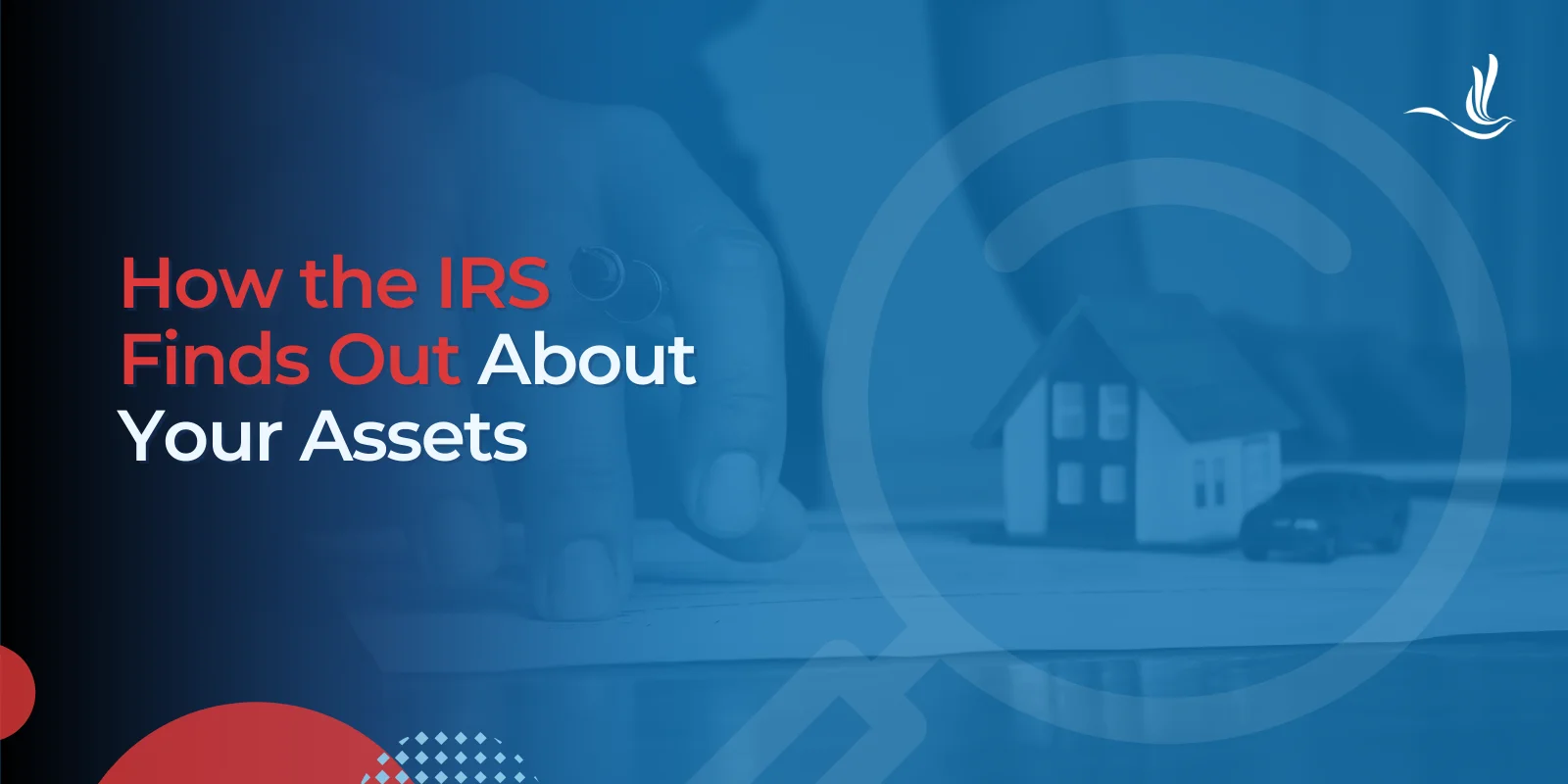Key Takeaways
The IRS learns about your income and assets through third-party reporting, including W-2s, 1099s, mortgage records, and brokerage statements.
Public records, such as property deeds, vehicle registrations, and business licenses, help the IRS track what you own and link assets to your name or Social Security Number.
The IRS uses automated matching systems and programs like the AUR to flag discrepancies, often sending CP2000 notices to propose adjustments for unreported income.
During collections, the IRS can trace assets, file tax liens, or issue levies on bank accounts, wages, real estate, or future refunds.
Foreign accounts aren’t hidden; FATCA and FBAR laws require banks and taxpayers to report international holdings.
You can see what the IRS knows about you by requesting Wage & Income Transcripts and checking for federal tax liens in public records.
The IRS has a reputation for being one of the most powerful collection agencies in the world, and for good reason. When you owe back taxes or fail to report income, the IRS has multiple ways of uncovering what you own and where your money is. Many taxpayers wonder: how does the IRS find your assets, and how much do they really know about your finances?
The truth is, the IRS doesn’t need to “spy” on you to figure it out. Thanks to third-party reporting, public records, and its own sophisticated databases, the agency likely knows far more about your bank accounts, property, and income sources than you realize. Understanding how the IRS tracks assets is critical if you owe back taxes, are facing an audit, or want to avoid costly penalties.
In this guide, we’ll break down exactly how the IRS finds your assets, what they can access, and what happens if you don’t cooperate.
How the IRS Gets Information About Your Assets
When taxpayers ask how the IRS finds their assets, the first step is to understand that much of the information is already being reported to them, often automatically. Employers, banks, brokers, and even foreign financial institutions are required by law to send financial details directly to the IRS.
Third-Party Reporting: W-2s, 1099s, and Beyond
The most common way the IRS learns about your income and assets is through third-party reporting forms:
W-2s report wages from employers.
1099-INT reports interest income from financial institutions.
1099-DIV reports dividend payments.
1099-B reports sales of stocks and securities.
1098 forms report mortgage interest, which ties you to property ownership.
For example, if you sell shares through a brokerage, the IRS automatically gets a copy of the 1099-B showing the sale price. Even if you “forget” to include it on your tax return, the IRS already has the numbers.
Public Records Searches
The IRS also relies heavily on public records. Property deeds, DMV vehicle registrations, court filings, and business licenses are accessible records that can show what you own. If you purchase a rental property, your deed is a matter of public record. The IRS can use this to track real estate assets connected to your Social Security Number (SSN).
Bank and Financial Institution Records
While banks don’t hand over account balances daily, the IRS can obtain information from financial institutions if needed. For instance, during a tax audit or collection action, the IRS may issue a bank summons requiring the institution to disclose account details.
Foreign Accounts: FATCA and FBAR
Many taxpayers believe overseas accounts are hidden from the IRS, but this is a dangerous misconception. Under the Foreign Account Tax Compliance Act (FATCA), foreign banks must report U.S. account holders. In addition, U.S. taxpayers with more than $10,000 in foreign accounts must file a Report of Foreign and Financial Accounts (FBAR). Failure to do so can result in penalties of $10,000 per form per year, or much higher for willful violations.
IRS Databases and Matching Systems
Once information is collected, the IRS runs it through sophisticated computer systems designed to catch discrepancies. These systems are at the heart of how the IRS finds your assets without much effort on their part.
Information Returns Matching System
Every year, the IRS matches tax returns against information statements like W-2s and 1099s. If your reported income doesn’t align with what third parties reported, the system will flag your account.
For example, if your bank reports $2,000 in interest income on a 1099-INT, but you only report $200, the mismatch alerts the IRS.
Automated Underreporter Program (AUR)
The IRS Automated Underreporter (AUR) program is a system the IRS uses to identify discrepancies between what taxpayers report on their tax returns and what third-party sources report to the IRS. The AUR program takes matching a step further by generating CP2000 notices for discrepancies. These notices may propose additional taxes based on unreported income or incorrect reporting. For many taxpayers, this is the first sign that the IRS already knows about missing financial details.
Collection Information Statements (Forms 433)
When taxpayers request installment agreements, Offers in Compromise, or hardship status, the IRS requires a Collection Information Statement (Form 433-A, 433-B, or 433-F). These forms require you to list bank accounts, property, investments, retirement accounts, and monthly expenses. If you fail to disclose everything, the IRS can verify it through cross-checks and public records.
How the IRS Locates Taxpayers and Assets During Collections
When a tax debt goes unpaid, the IRS begins the collection process. This is where its asset finding tools are used most aggressively.
Notices and Balance-Due Letters
The collection process starts with a simple notice: a letter stating the amount you owe, including penalties and interest. If you don’t respond, the IRS escalates its collection methods.
Skip-Tracing Techniques
To locate taxpayers who haven’t paid, the IRS uses techniques similar to enforcement collectors:
Reviewing credit reports for loans, credit cards, and asset information.
Searching DMV records for vehicle ownership.
Checking professional licenses that might signal income potential.
Asset Tracing for Collection
The IRS also uses tracing methods to connect taxpayers to assets. For example, if you receive rental income through a property management company, the IRS may trace the 1099-MISC back to your ownership of the rental property.
Federal Tax Liens
If you don’t pay your tax debt, the IRS can file a Notice of Federal Tax Lien in the public record. A lien legally attaches to all property you own and any future property acquired. This means if you later buy a new car, the lien attaches to that vehicle automatically.
What the IRS Can Access Directly
Beyond information gathering, the IRS has legal authority to seize certain assets directly when taxpayers refuse to pay.
Bank Accounts and Levies
One of the most feared tools is the bank levy, which freezes and removes money directly from your account. Once a levy hits, you may have little time to release it before funds are taken.
Wages and Income Streams
The IRS can garnish wages by contacting your employer. Unlike private creditors, the IRS does not need a court judgment to do this. They can also levy Social Security payments, pensions, and retirement distributions.
Real Estate and Personal Property
In extreme cases, the IRS can seize real estate, vehicles, boats, and other valuable personal property. While rare, property seizures do happen when taxpayers ignore repeated notices.
Refund Offsets
If you are due a federal or state tax refund, the IRS can automatically offset it against your outstanding balance. Many taxpayers are surprised when expecting a refund, only to find it applied toward past-due taxes.
What Happens if the IRS Wants More Details
Sometimes, the IRS needs additional documentation to confirm your financial situation. This usually happens during audits or when you request relief.
IRS Audits and Inquiry Letters
If your return is selected for an audit, you may receive an inquiry letter requesting proof of income, deductions, or expenses. The IRS may also ask for bank statements, receipts, or other supporting documents.
Financial Disclosure for Payment Plans
Taxpayers requesting installment agreements or Offers in Compromise must provide detailed financial disclosures. Hiding assets is risky; if the IRS finds inconsistencies, it can deny your request and pursue enforcement.
Non-Cooperation Consequences
If you refuse to cooperate or provide incomplete information, the IRS can use summons authority to obtain records directly from banks, employers, and third parties. They can then move forward with liens and levies.
Common Misconceptions About IRS Asset Tracking
There are several myths surrounding how the IRS finds your assets. Believing these misconceptions can lead to costly mistakes.
“The IRS Can’t See My Bank Accounts”
While the IRS doesn’t have real-time access to your account, banks are required to report interest income. Plus, if the IRS suspects you’re hiding funds, they can issue a summons to your bank.
“They Won’t Find My Property”
Real estate deeds are public records. When the IRS files a lien, it attaches to both current and future property, making it virtually impossible to hide real estate assets.
“Foreign Accounts Are Safe”
Under FATCA, foreign banks report U.S. taxpayers’ account balances. Hiding overseas accounts can result in criminal charges, not just civil penalties.
How to See What the IRS Knows About You
If you’re worried about what the IRS has on file, there are ways to check.
Request a Wage & Income Transcript
The IRS provides a Wage & Income Transcript, which shows all income forms (W-2s, 1099s, 1098s) reported under your SSN. You can request this using Form 4506-T.
Review Your Tax Account Transcript
A tax account transcript shows balances due, interest, penalties, and whether liens have been filed. This gives insight into what stage of collection your case is in.
Check Public Records for Liens
Since federal tax liens are public, you can also search your county recorder’s office or state database to see if the IRS has filed one against you.
What to Do if You Owe and Can’t Pay
Knowing how the IRS finds your assets is one thing, dealing with the debt is another. Fortunately, there are options for taxpayers who cannot pay in full.
Payment Plans and Installment Agreements
The IRS offers short-term (up to 180 days) and long-term installment agreements. If you qualify, this allows you to pay smaller amounts over time.
Offer in Compromise (OIC)
An OIC lets you settle your tax debt for less than the full amount if you prove paying in full would cause financial hardship. The IRS uses strict formulas, including your assets and income potential, to determine eligibility.
Currently Not Collectible (CNC) Status
If you truly cannot pay, you may qualify for CNC status. This temporarily halts collection actions, though penalties and interest continue to accrue.
Why Cooperation Matters
The worst step you can take is ignoring the IRS. Proactively contacting them, even if you can’t pay, can prevent liens and levies. Working with a tax professional can also help you negotiate better terms.
So, how does the IRS find your assets? Through a powerful combination of third-party reporting, public records, financial disclosures, and direct collection powers. From bank accounts to foreign assets, there are few places to hide from the IRS if you owe taxes.
Frequently Asked Questions: IRS Finds Out About Your Assets
How does the IRS find out about unreported income? The IRS detects unreported income through third-party reporting systems like W-2s, 1099s, and bank interest forms. Its automated matching programs compare what employers and financial institutions report against your tax return, flagging discrepancies for review.
What are the biggest tax mistakes people make? Common tax mistakes include underreporting income, claiming ineligible deductions, failing to file or pay on time, and neglecting to report side gig or investment earnings. These errors often trigger IRS notices or penalties.
Does the IRS catch every mistake? While the IRS doesn’t catch every single error, its computer matching systems identify most discrepancies in income, credits, and deductions. Even small mismatches can prompt a CP2000 notice proposing an adjustment.
What will trigger an IRS audit? Audits are often triggered by large income changes, unreported income, excessive deductions, or inconsistencies between tax forms and third-party reports. Random selection also occurs, but most audits stem from red flags in your return.
What looks suspicious to the IRS? The IRS pays close attention to unusually high deductions, mismatched income reports, large cash transactions, and unreported foreign accounts. These factors can indicate potential underreporting or tax avoidance and increase your audit risk.
Tax Help for Understanding Your Assets and IRS Collections
The takeaway is clear, the IRS already knows far more than most taxpayers assume. If you’re behind on taxes or worried about asset seizures, your best move is to be proactive. Request your transcripts, review what the IRS has on file, and consider setting up a payment plan or negotiating a settlement.
Remember, ignoring the problem won’t make it go away, it only gives the IRS more reason to dig deeper into your assets. Optima Tax Relief is the nation’s leading tax resolution firm with over a decade of experience helping taxpayers with tough tax situations.
If You Need Tax Help, Contact Us Today for a Free Consultation


























